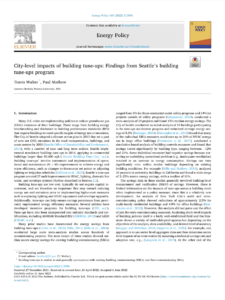Full Title: City-Level Impacts of Building Tune-ups: Findings from Seattle's Building Tune-ups Program
Author(s): Travis Walter and Paul Mathew
Publisher(s): Energy Policy
Publication Date: June 11, 2022
Full Text: Download Resource
Description (excerpt):
The City of Seattle adopted a climate action plan in 2013 that set a goal of zero net GHG emissions in the road transportation, buildings, and waste sectors by 2050, with a number of near and long term actions. Seattle implemented mandatory building tune-ups in 2016, applying to commercial buildings larger than 50,000 sqft.
Seattle’s building tune-ups program has now been in effect for several years and affords an opportunity for a stock-level empirical analysis to address questions such as: What are the expected stock-level energy savings due to implementing a tune-ups program? Are particular types of buildings expected to save more than others? Do particular issues result in higher savings when corrected? Which issues are most important to check for when conducting a tune-up? Does the tune-up specialist impact the savings and issues found? In this paper, we explore the answers to these questions by analyzing Seattle’s building tune-up program data to date, and discuss the implications of our findings for other cities considering a building tune-ups program as part of their suite of policies to meet building sector energy and carbon reduction goals. The paper contributes to the literature about the impacts of tune-ups in two ways: First, it assesses the degree to which impacts of a tune-ups program can be discerned at the stock level just based on measured data, without normalizing for changes in building operations before and after the tune-ups. Stated differently, we look at the extent to which the “signal” from the tune-ups is discernible from the “noise” of other drivers of year-to-year variations in building energy use. Second, it seeks to identify any stock-level empirical evidence of relationships between tune-ups issues and building characteristics, which in turn can help streamline policy implementation through better targeting and tailoring the scope of tune-ups. While there has been limited evidence to date of such relationships (City of Portland, 2018), the tune-ups program affords an opportunity to add to the body of evidence with a new dataset.
